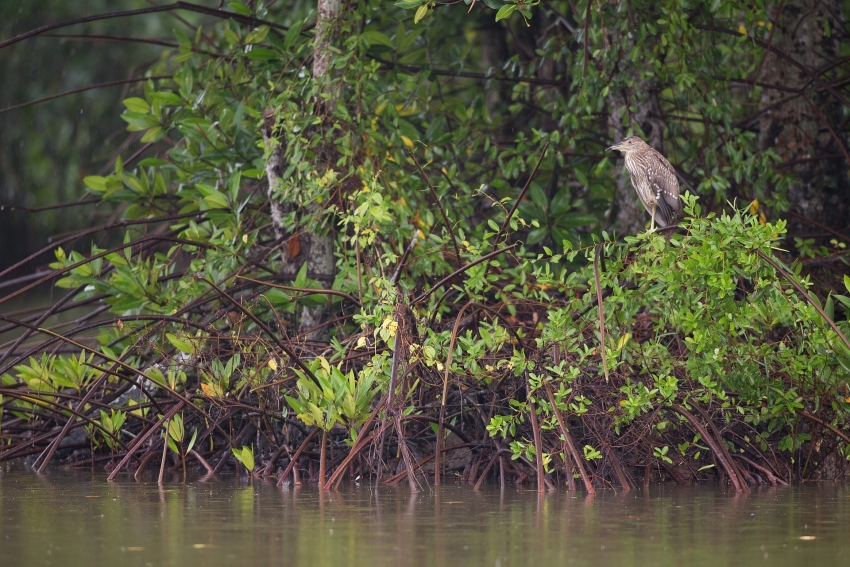Generate 150ha mangrove forest in Mui Ca Mau National Park to fight climate change
 |
| HSBC Vietnam and WWF will nourish the mangrove forest in Mui Ca Mau National Park |
HSBC Vietnam has partnered with World Wide Fund for Nature (WWF) Vietnam, to implement a mangrove forest restoration project in Mui Ca Mau National Park in the southernmost tip of mainland Vietnam.
The five-year VND10 billion ($434,780) project will generate 150 hectares of mangrove forests that will in turn help address serious socio-environmental challenges, such as climate change, water security, water pollution, food security, human health, and disaster risk management.
According to HSBC’s recent report “Tackling the next crisis”, for Asia, climate change is defined as the crisis of the century, not the coronavirus pandemic and Vietnam is among the countries that can be most impacted. Ho Chi Minh City is among many cities in Asia (besides Mumbai, Shanghai, Bangkok, and Jakarta) that are being increasingly threatened by rising sea levels.
The country is also ranked in the top five for agricultural sector risk scores by Food and Agricultural Organisation (FAO) and HSBC and typhoon-induced damage on agricultural production is set to increase. On the other hand, Asia is not just on the receiving end of climate change: it has become an integral part of perpetuating the problem.
The region has accounted for 87 per cent of global greenhouse gas and 78 per cent of CO2 emissions growth since 1990. Among reasons which could be so preventable, deforestation has become a major emissions contributor in Southeast Asia, including Vietnam.
Within the scope of the project, HSBC Vietnam works alongside conservationist experts from WWF-Vietnam to develop a far-reaching and innovative programme that will nurture the vulnerable ecology of Mui Ca Mau National Park, the Mekong Delta and beyond. The project is expected to support Vietnam’s commitment in the Paris Agreement which is an 8 per cent reduction in emissions by 2030 (compared to business as usual levels) or 25 per cent, conditional upon international support. Specifically, the project will also support the country’s pledge of increasing forest cover to 45 per cent.
The 150ha mangrove forest will be regenerated by applying newly-developed natural mangrove regeneration technology to ensure the highest possibility of tree growth. When reaching maturity, this 150ha mangrove forest will be able to sequestrate at least 20,000 tonnes of carbon per year, reducing CO2 levels. The mangrove trees will also form a buffer between the land, sea, and rivers, helping maintain this patch of the Mekong Delta and shield it from natural disasters.
In addition, this new forest area will provide ecosystem services for more than 10,000 households by protecting them from flooding and improving their fishery spawning ground by up to 350-390 tonnes of seafood per year. This project is also poised to explore the best management practices and disseminate them to buffer zone communities for alternative livelihood solutions.
Another component of the project will also feature an education programme on forest protection and biodiversity conservation for about 3,000 households in the core zone of the national park, raising their awareness about conservation issues.
Especially the project framework will also involve the prolonged engagement of HSBC staff volunteers who will deliver a genuine impact on the ground through the delivery of environmental services within the national park.
Van Ngoc Thinh, country director of WWF-Vietnam said: “The multi-year dynamic partnership between HSBC and WWF-Vietnam is ramping up in the super year 2020. It provides a unique platform and multiplies the impact of the HSBC Water Programme which has benefited more than 2.5 million people in total across five major river basins of the world. The green and just response to the current environmental crisis as a whole at the heart of recovery strategies, investments and decisions, and actions through this partnership will contribute to reversing biodiversity loss by 2030 to reach sustainable development goals and future-proof our country.”
“The contribution of corporates in the community cannot just be limited to conducting business in a sustainable manner, and/or contributing to the overall economic growth of the country but they must also use their resources to try to minimise any negative environmental impact and help improve the living standards of the community”, added Evans, “With a presence of 150 years in Vietnam and as a leading international bank, we also see part of our mission in the country to help preserve its nature and environment.”
This project in Vietnam is part of HSBC Group’s latest climate commitment announced on October 2020, a philanthropic programme to donate $100 million to scale climate innovation ventures, renewable energy, and nature-based solutions all across the globe in the same five-year period. Also, this is just one of many exciting initiatives that coincide with the 150th anniversary of HSBC’s entry in Vietnam.
What the stars mean:
★ Poor ★ ★ Promising ★★★ Good ★★★★ Very good ★★★★★ Exceptional
Related Contents
Latest News
More News
- Congratulations from VFF Central Committee's int’l partners to 14th National Party Congress (January 25, 2026 | 09:46)
- List of newly-elected members of 14th Political Bureau announced (January 23, 2026 | 16:27)
- 14th Party Central Committee unanimously elects To Lam as General Secretary (January 23, 2026 | 16:22)
- List of members of 14th Party Central Committee announced (January 23, 2026 | 09:12)
- Highlights of fourth working day of 14th National Party Congress (January 23, 2026 | 09:06)
- Press provides timely, accurate coverage of 14th National Party Congress (January 22, 2026 | 09:49)
- Press release on second working day of 14th National Party Congress (January 22, 2026 | 09:19)
- Minister sets out key directions to promote intrinsic strength of Vietnamese culture (January 22, 2026 | 09:16)
- 14th National Party Congress: Renewed momentum for OVs to contribute to homeland (January 21, 2026 | 09:49)
- Party Congress building momentum for a new era of national growth (January 20, 2026 | 15:00)

 Tag:
Tag:


























 Mobile Version
Mobile Version